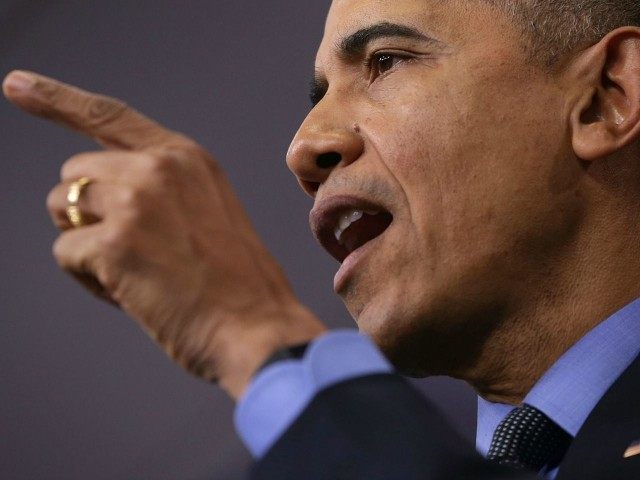On January 4, the White House released a fact sheet which previews the executive gun control Obama will announce Tuesday, and it reveals there is no numerical threshold of sales that a private seller has to cross before being considered “engaged in the business of dealing in firearms.”
In other words, previous hints that there would be a “trigger”—a certain number of guns that a private seller had to sell before being considered “engaged in the business”—are now out the window.
Figures like those reported by NBC News, wherein they quoted sources saying, “the administration has considered 50 or 100 guns a year as the threshold to trigger these requirements,” have been discarded. A more fluid system—whereby any private seller can be considered “engaged in the business of dealing in firearms” regardless of the number of guns he sells or the frequency by which he sells them—seems to be what Obama has in mind.
And the language of the executive gun control shows that private sellers who occasionally advertise online or sell at gun shows can certainly be considered “engaged in the business” and, therefore, required to get an Federal Firearms License (FFL) and go through background checks each time they sell a gun.
Here is the exact wording from the White House executive order preview:
A person can be engaged in the business of dealing in firearms regardless of the location in which firearm transactions are conducted. For example, a person can be engaged in the business of dealing in firearms even if the person only conducts firearm transactions at gun shows or through the Internet. Those engaged in the business of dealing in firearms who utilize the Internet or other technologies must obtain a license, just as a dealer whose business is run out of a traditional brick-and-mortar store.
The order continues:
Quantity and frequency of sales are relevant indicators. There is no specific threshold number of firearms purchased or sold that triggers the licensure requirement. But it is important to note that even a few transactions, when combined with other evidence, can be sufficient to establish that a person is “engaged in the business.” For example, courts have upheld convictions for dealing without a license when as few as two firearms were sold or when only one or two transactions took place, when other factors also were present.
The bottom line—one aspect of Obama’s executive gun control is aimed at greatly diminishing the avenues by which private gun sales can occur in the United States. It does this by increasing the occasions on which background checks must be performed in order to buy or sell a gun.
This expansion of background checks will bring more guns into the federal paperwork trail, which is something Obama, Sen. Joe Manchin (D-WV), Hillary Clinton, and Micheal Bloomberg have been wanting to do for years. And by accomplishing this, it sets the stage for even bigger gun controls in the future.
Follow AWR Hawkins on Twitter: @AWRHawkins. Reach him directly at awrhawkins@breitbart.com.

COMMENTS
Please let us know if you're having issues with commenting.